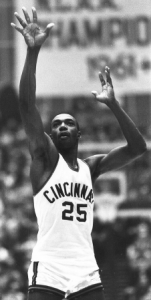In the late 1950s, a lot of young black athletes in and around Cincinnati were excited by the exploits of baseball player Frank Robinson, the Cincinnati Reds’ first African-American superstar, and basketball player Oscar “The Big O” Robertson, the 6-foot-5 star of the University of Cincinnati Bearcats who was considered the best player in the nation.

Billy Reed is a member of the U.S. Basketball Writers Hall of Fame, the Kentucky Journalism Hall of Fame, the Kentucky Athletic Hall of Fame and the Transylvania University Hall of Fame. He has been named Kentucky Sports Writer of the Year eight times and has won the Eclipse Award three times. Reed has written about a multitude of sports events for over four decades and is perhaps one of the most knowledgeable writers on the Kentucky Derby. His book “Last of a BReed” is available on Amazon.
It was about time for integration to come to Cincinnati and its surrounding communities. In 1947, when Jackie Robinson was breaking major-league baseball’s color barrier as a member of the Brooklyn Dodgers, he said Cincinnati treated him worse than any city in the National League.
The booing and name-calling were so vicious during his first appearance at Crosley Field that Dodgers’ captain Pee Wee Reese, from Louisville, felt compelled to come across the infield and sling an arm around Robinson’s shoulders, an act of solidarity that was intended to show the crowd that the Dodgers had their new teammate’s back.
In Covington, directly across the Ohio River from Cincinnati, a young black kid named Tom Thacker took a special interest in Robertson because basketball was his best sport. By his senior year in 1958-’59, Thacker was good enough to lead Covington Grant to the Kentucky State High School Tournament, where he scored 36 points in an 85-84 quarterfinals loss to Olive Hill.
Upon his graduation from Holmes High School, Thacker surprised nobody by announcing he would play his college ball at Cincinnati, where Robertson was a senior. The “Big O” led the Bearcats to the Final Four in Louisville’s Freedom Hall, but lost to eventual champion California, 64-58. The Bearcats then whipped Louisville, 98-85, in the consolation game.
Of course, Thacker had only one choice if he wanted to spend his college career in Kentucky, and that was all-black Kentucky State in Frankfort. Integration didn’t come to college basketball in the Bluegrass State until the University of Louisville signed three blacks – Wade Houston, Sam Smith, and Eddie Whitehead – in 1962.
So as Black History Month comes to a close, it’s worth remembering Tom Thacker. While his hero Robertson never won a national championship, Thacker was a starter on the Bearcats’ 1961 and ’62 national-title teams. His senior team also made it to the championship game, again in Freedom Hall, but lost to Loyola of Chicago in overtime.
At 6-feet-5, Thacker wasn’t the leading scorer or rebounder on those teams. But he was captain as a junior and senior because of his unselfish attitude and his will to win. Teammates such as Ron Bonham, Paul Hogue, George Wilson, and Tony Yates all benefitted from Thacker’s maturity and leadership.

After Thacker’s historic career at UC was over, the Cincinnati Royals claimed him under the NBA’s “territorial” rule by which teams automatically got the right to pick players from their immediate area. He finally got to be Robertson’s teammate during three years with the Royals but retired from the NBA when the Chicago Bulls picked him in the 1966 expansion draft.
After a year in the Continental Basketball League, Thacker returned to the NBA when the Boston Celtics signed him as a free agent in 1967 and won the NBA title with Thacker playing a reserve role. In 1968, he was taken by the Milwaukee Bucks in another expansion draft but opted to play for the Indiana Pacers in the fledgling American Basketball Association. In 1970, the Pacers won the ABA title and Thacker retired a year later as the only player ever to win NCAA, NBA, and ABA championship rings.
“But that list is incomplete,” Thacker said when inducted into the Ohio Athletic Hall of Fame. “That year I sat out and played in the Continental League, my team won the championship. I got a ring from that, too, and still wear it.”
After receiving both bachelor’s and master’s degrees from UC, Thacker became the university’s first black head coach, heading the women’s program from 1974-’77. He also spent several years teaching in the Cincinnati school system before starting his own business, Tom Thacker Enterprises. Today he is retired.
Since Thacker’s days, Northern Kentucky had produced many fine black athletes. But Thacker’s place in the area’s cultural history is secure. Just consider all those rings. And the fact his career unfolded against the volatile backdrop of the civil rights movement makes his achievements even more significant. No racist was going to deny Thacker the opportunity he saw and clutched while cheering for the “Big O.”


















Tom attended William Grant High School in Covington and was coached by the legendary Jim Brock. William Grant High also produced George Stone, an ABA all-star.